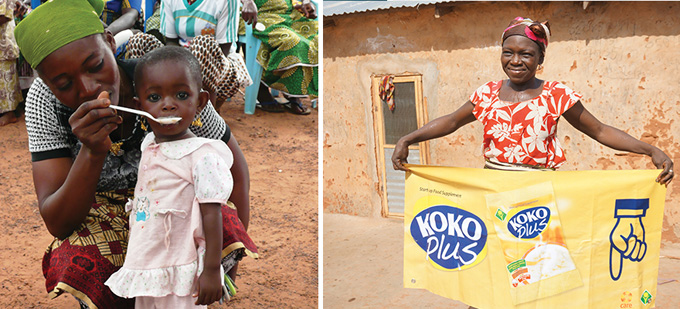Spotlight on the Ghana Nutrition Improvement Project – KOKO Plus
The Ghana Nutrition Improvement Project was launched in 2009 by the Ajinomoto Group to help solve the pressing issue of malnutrition in the country. In particular, the core project partners aim to improve the nutritional outcomes of an estimated 200,000 children aged 6-24 months by 2017 by providing a supplement named “KOKO Plus”.
Today the project has only reached 1/10 of the target (reaching20,000 children) due to the difficulty of social business and public-private partnership.
Koko, which is a traditional weaning food in Ghana, is a porridge made with fermented corn. This meal does not meet the nutritional requirements recommended by the World Health Organization and other international organizations because it is lacks in energy, protein, and micronutrients. On the other hand, KOKO Plus is nutrition supplement that contains an amino acid to be added to Koko in
the cooking process to cover the nutritional deficiency of the meal.
Today the project has only reached 1/10 of the target (reaching20,000 children) due to the difficulty of social business and public-private partnership.
Koko, which is a traditional weaning food in Ghana, is a porridge made with fermented corn. This meal does not meet the nutritional requirements recommended by the World Health Organization and other international organizations because it is lacks in energy, protein, and micronutrients. On the other hand, KOKO Plus is nutrition supplement that contains an amino acid to be added to Koko in
the cooking process to cover the nutritional deficiency of the meal.
- The product started to be sold in 2014, further to positive tests on preservation stability and surveys on taste, as well as tests to confirm the nutritional effect of the supplement.
- The project is being implemented through a new sustainable business model by forming partnerships to foster open innovation with the local government and other local stakeholders, experienced NGOs, international organizations and other corporate entities.
The key components of this business model are:
- In depth Understanding of Local Needs Identify local needs in order to provide local people with a product that helps them improve their nutritional status in a way that suits local food culture and tastes at an affordable price.
- Producing Locally with a Local Partner
Local production using locally grown soybeans and other ingredients helps foster local agriculture and create employment - Communicating the Importance of Nutrition to Local MothersIt is necessary for local mothers to have correct knowledge about nutrition as a precondition to encourage the mothers to make appropriate use of KOKO Plus to improve the nutritional status of their children.
- Building up a Innovative Distribution Model In Ghana, there are areas with few retail stores due to the lack of necessary distribution infrastructure. In response, the program supports the empowerment of women in the northern part of the country, to develop a local system for women of each village to serve as salespersons for the product, in addition to promoting sales through the traditional distribution route.


Comments
Post a Comment